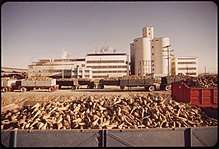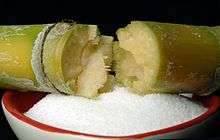Sugar industry
The sugar industry subsumes the production, processing and marketing of sugars (mostly saccharose and fructose). Globally, most sugar is extracted from sugar cane (~80 % predominantly in the tropics) and sugar beet (~ 20%, mostly in temperate climate like in the U.S. or Europe).

Sugar is an essential basis for soft drinks/sweetened beverages, convenience foods, fast food, candy / sweets, confectionery, baking products and the respective industries.
Sugar subsidies have driven market costs for sugar well below the cost of production. As of 2018, 3/4 of world sugar production is never traded on the open market. The global market for sugar and sweeteners is ~$77.5 billion in 2012, with sugar comprising an almost 85% share, according to estimates in a 2013 report from BCC Research. The market is thought to increase at a compound annual growth rate of 4.6%.[1]
Around 160 million tonnes of sugar is produced every year. The largest producers are Brazil (72%), India (15%) and the European Union (10%). There are more than 123 sugar-producing countries, but only 30% of the produce is traded on the international market. In 2011 global sugar export trade was worth $47bn, with $33.5bn of sugar exports from developing countries, and $12.2bn from developed countries.[2]
Market
Sugar subsidies have driven market costs for sugar well below the cost of production. As of 2018, 3/4 of world sugar production is never traded on the open market. Brazil controls half the global market, paying the most ($2.5 billion per year) in subsidies to its sugar industry.[3]
The US sugar system is complex, using price supports, domestic marketing allotments, and tariff-rate quotas.[4] It directly supports sugar processors[4][5] rather than farmers growing sugar crops.[3] The US government also uses tariffs to keep the US domestic price of sugar 64 to 92% higher than the world market price, costing American consumers $3.7 billion per year.[5] A 2018 policy proposal to eliminate sugar tariffs, called "Zero-for-Zero", is currently (March 2018) before the US Congress.[3][6] Previous reform attempts have failed.[7]
The European Union (EU) is a leading sugar exporter. The Common Agricultural Policy of the EU used to set maximum quotas for production and exports, and a subsidized sugar sales with an EU-guaranteed minimum price.[8][9] Large import tariffs were also used to protect the market.[8] In 2004, the EU was spending €3.30 in subsidies to export €1 worth of sugar, and some sugar processors, like British Sugar, had a 25% profit margin.[10]
A 2004 Oxfam report called EU sugar subsidies "dumping" and said they harm the world's poor.[10] A WTO ruling against the EU quota and subsidy system in 2005-2006[11] forced the EU to cut its minimum price and quotas, and stop doing intervention buying.[8] The EU abolished some quotas in 2015,[12][13], but minimum prices remain.[12][14][15] Tariffs also persist for most countries.[16] In 2009, the EU granted Least Developed Countries (LDCs) zero-tariff access to the EU market[8] as part of the Everything but Arms initiative.[9]
As of 2018, India, Thailand, and Mexico also subsidize sugar.[3]
Glucose syrups produced from wheat and corn (maize) compete with the traditional dry sugar market.
Global players
The top 10 sugar-producing companies based on production in 2010:[17]
| Rank | Company | 2010/11 Output [Mt] | Country |
|---|---|---|---|
| 1. | Südzucker AG | 4.2 | Germany |
| 2. | Cosan SA Industria & Comercio | 4.1 | Brazil |
| 3. | British Sugar Plc | 3.9 | UK |
| 4. | Tereos Internacional SA | 3.6 | France |
| 5. | Mitr Phol Sugar Corp. | 2.7 | Thailand |
| 6. | Nordzucker Gmbh & Co KG | 2.5 | Germany |
| 7. | Louis Dreyfus | 1.8 | Netherlands |
| 8. | Wilmar International Ltd. | 1.5 | Singapore |
| 9. | Thai Roong Ruang Sugar Group | 1.5 | Thailand |
| 10. | Turkiye Seker Fabrikalari | 1.34 | Turkey |
The global sugar industry has a low market share concentration. The top four sugar producers account for less than 20.0% of the market.[18]
Products
Organizations
References
- ↑ "Global Sugar, Sweeteners Market to Hit $97 Billion by 2017". naturalproductsinsider.com. April 18, 2013.
- ↑ "Fairtrade and sugar briefing" (PDF). fairtrade.net. 2013.
- 1 2 3 4 https://www.washingtontimes.com/news/2018/mar/16/steel-sugar-subsidies-hinder-free-trade/
- 1 2 https://www.ers.usda.gov/topics/crops/sugar-sweeteners/policy.aspx
- 1 2 http://www.startribune.com/sugar-subsidies-are-sweet-but-not-for-the-taxpayer/226532001/
- ↑ https://yoho.house.gov/media-center/in-the-news/yoho-zero-for-zero-sugar-policy-is-a-trade-win-win-for-everyone
- ↑ https://www.cato.org/publications/commentary/why-congress-should-repeal-sugar-subsidy
- 1 2 3 4 http://news.bbc.co.uk/2/hi/business/4118448.stm
- 1 2 https://ec.europa.eu/agriculture/sites/agriculture/files/sugar/doc/sugar-faq_en.pdf
- 1 2 https://www.oxfam.org/sites/www.oxfam.org/files/bp61_sugar_dumping_0.pdf
- ↑ https://www.ictsd.org/bridges-news/biores/news/brazil-claims-victory-after-wto-ruling-on-eu-sugar-subsidies
- 1 2 https://ec.europa.eu/agriculture/sugar_en
- ↑ https://ec.europa.eu/jrc/en/publication/eur-scientific-and-technical-research-reports/eu-sugar-policy-sweet-transition-after-2015?search
- ↑ https://www.tralac.org/discussions/article/5684-the-end-of-the-eu-sugar-quota-and-the-implication-for-african-producers.html
- ↑ https://www.theguardian.com/business/2017/mar/27/brexit-sugar-beet-cane-tate-lyle-british-sugar
- ↑ https://www.theguardian.com/business/2017/mar/27/brexit-sugar-beet-cane-tate-lyle-british-sugar
- ↑ Chanyaporn Chanjaroen (November 4, 2011). "Suedzucker Leads the Top 10 Sugar-Producing Companies". Bloomberg.com.
- ↑ "Global Sugar Manufacturing: Market Research Report". IBISWorld. 2016.
External links
- "The international journal for the sugar, sweetener and ethanol industry – beet, cane and starch".
- Joyeeta Basu (2015-02-26). "UK sugar industry sales drop by 14%". FOODnavigator.com.
See also
- Criticisms of the sugar industry
- Sugar industry of the Philippines
- Fruit industry
- Food industry
- Diet and obesity
- Category:Sugar industry
Further reading
- Matthew Parker (2012). The sugar barons. Windmill Books. ISBN 978-0099558453.
- Mosen Asadi (2006). Beet-Sugar Handbook. John Wiley & Sons. ISBN 978-0471763475.
- Michael Moss (2014). Salt, Sugar, Fat: How the Food Giants Hooked Us. WH Allen. ISBN 978-0753541470.
